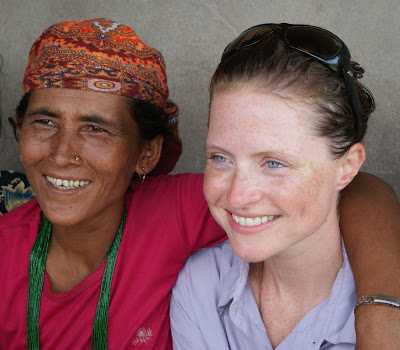The Edge of Seven is an extraordinary philanthropic organization we've just discovered - and are eager to share with our Wandering Educators. I had a chance to talk with Erin Guttenplan, Director of Edge of Seven last week, and are fully committed to sharing and supporting their work, especially in Nepal.

WE: Please tell us about Edge of Seven...
EG: At Edge of Seven, we connect volunteers with service projects in developing countries that are designed to empower girls at the local level. Volunteers may be building a dorm so that girls can attend high school, constructing a water supply for an entire village, or erecting biogas toilets to fuel stoves so that girls no longer have to spend hours per day searching for firewood. The best part is that volunteers can serve abroad for a minimum of two weeks or for up to several months! We are true believers in the philosophy that getting out and seeing the world will help people become more effective at changing it.
WE: What was the genesis of your site?
EG: Edge of Seven began about two years ago when I took off for five months to volunteer in Nepal, India, Thailand, and Cambodia. I saw genuine need in rural parts of each country, particularly as it related to education, health and economic opportunity for girls. Likewise, I met hundreds of volunteers who were searching for meaningful service projects where they could truly make a difference. I saw Edge of Seven as a win/win; a way to meaningfully connect volunteers with sustainable projects driven by locals.
WE: What does edge of seven mean?
EG: When we created the name "Edge of Seven", we liked the word "edge" because we felt that it denoted adventure. When a volunteer is living in a rural village with a Nepali host family, digging a foundation for a school, and showering with a bucket, the phrase "living on the edge" describes the experience to a T. Seven is the idea that we'd like to support projects on all seven continents throughout the future. It's our vision.

WE: How can travelers best help others, while overseas?
EG: In my humble opinion, travelers can best help others abroad through service projects. There is quite the debate over whether it's more beneficial to send a check for $3,000 to a nonprofit like Edge of Seven that supports international projects OR to spend $3,000 on a program fee to serve for two weeks in a developing country like Nepal. I think it's ALWAYS a better investment to spend the $3,000 on the experience because it is life-changing and will alter a volunteer's perspective on the world. As a result of the experience, volunteers often become even stronger advocates for global social change and influence more people throughout their lives. The key is in finding the RIGHT service project, one that genuinely addresses local need, is led by local leadership, and provides volunteer support in the form of translators, medical personnel, and housing.
WE: What are the best ways to fuse personal and global development?
EG: The best way to fuse personal and global development is to apply what you have learned. It's easy to return from a life-changing experience and settle back into the daily grind. The real development happens when you experience the challenges that face developing nations, a life without water, education, or healthcare, and you decide that you won't stand for it anymore. That's when personal development crosses over into global development. You can fundraise, screen documentaries, and create awareness at home so that others volunteer and donate. You can work for a nonprofit, NGO, or other organization focused on global development to intervene. You can ACT.
WE: Can you please share about your documentary, the Mountain Between Us?
EG: The Mountain Between Us is a 12 minute documentary exposing the challenges that girls face when trying to pursue education in rural Nepal. The film will document the story of two Nepali girls as they leave their villages and become the first in their families to attend higher secondary school. Despite the odds, these remarkable girls are determined to build a future for themselves and their communities.
We are in the pre-production process right now and raising $6,000 in funds to complete shooting this May with an expected August release date. The film will be screened in communities and film festivals across the country to bring visibility to this important issue. If you are interested in supporting this project, whether it’s donating or sharing our trailer with at least three people, it will go a long way towards helping provide more schools and more opportunities for girls in the developing world.
WE: What projects are you working on, right now?
EG: We're currently building a hostel in the Everest Region of Nepal to house 40 girls from remote areas where higher secondary school is not accessible. In this region, seven out of every 10 girls drops out of school after 10th grade because their village is not within walking distance of the campus and they cannot afford room and board. We're hoping to change that. We still have openings for volunteers on our June 28th group in Nepal for those who are ready for the adventure of a lifetime!

WE: Is there anything else you'd like to share with us?
EG: Check us out online at www.edgeofseven.org! We’d love to hear from you!
WE: Thanks so much, Erin! We are extremely impressed by your work and are looking forward to following your efforts.
All photos courtesy and copyright Edge of Seven
